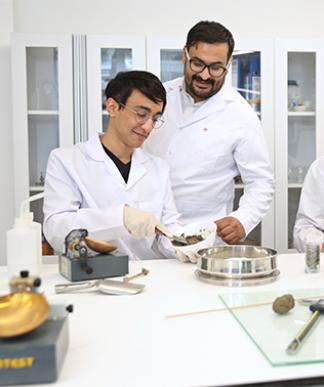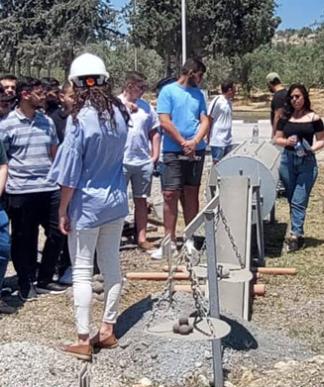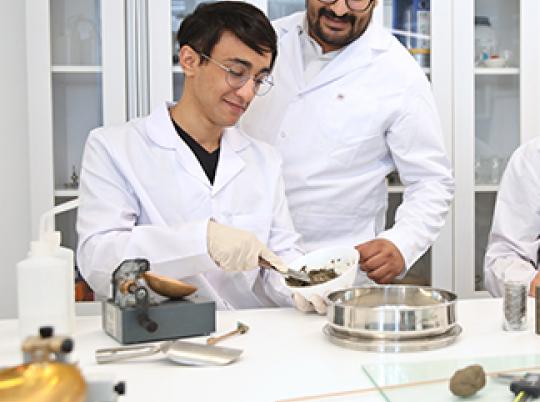


About the Program
Civil Engineering consists of the fields of construction, geotechnical skills, hydraulic transportation, construction management, and construction materials. The CIU Department of Civil Engineering has a strong national link with international presence. It has a leadership role as its laboratory facilities rank first among the other civil engineering departments in our country. It provides a quality education by using its physical infrastructure in the best way and giving prominence to the understanding of contemporary education.
After completing their first year in basic science courses, students take courses such as applied mechanics, construction, hydraulics, hydromechanics, topography, geotechnical engineering, transport engineering, materials, construction, and construction management. The academic program of Civil Engineering also includes mathematics, computer programming, and non-departmental social-based courses. In addition to their practical education in the department, students are encouraged to conduct theoretical research as well.
Education Opportunities
Employers and company owners expect civil engineering graduates to have a strong educational background, understand the market, and be competent in adapting themselves to leadership and group projects. For this reason, students improve themselves through conducting experiments on building sites with the required conditions. Supervised by their teachers, students take part in scientific projects that contribute to science and to the national economy. Students graduate with high self-esteem and are self-sufficient and competent in meeting society’s needs. Increasing potential research also creates a need due to findings related to new materials and technologies to be applied to constructions.

Accreditations
After completing their first year in basic science courses, students take courses such as applied mechanics, construction, hydraulics, hydromechanics, topography, geotechnical engineering, transport engineering, materials, construction, and construction management. The academic programme of Civil Engineering also includes maths, computer programming, and non-departmental social-based courses. In addition to their practical education in the Department, students are encouraged to conduct theoretical research.
Click to learn more about the Civil Engineering Program's mission, outcomes and educational goals.
Career Areas
Civil engineering graduates are obliged to develop an educational understanding that is close to that of the current market and be competent in adapting themselves to leadership and group work. Students graduating from this program have a wide range of career opportunities such as the construction of basic engineering buildings, bridges, roads, tunnels, railways, airports, ports, sewerage networks, water treatment plants, dams, and lakes. They can work in public institutions, the private sector, or establish their own offices. Since the need for civil engineers will increase in the future, students have a high possibility of securing a livelihood.
Contact
Faculty of Engineering
Science and Technology Center, ST 226
Tel: +90 392 671 1111 Extension: 2401
Faculty E-mail: secretary-fe@ciu.edu.tr
Head of Department: Assoc. Prof. Dr. Ayşe Pekrioğlu BALKIS
Head of Department E-mail: apekrioglu@ciu.edu.tr
Compulsory Courses
First Semester
GENERAL CHEMISTRY
Course code
CHEM110Credit
4Theoretical
3Practical
2Ects
6INTRODUCTION TO COMPUTING
Course code
CMPE101Credit
3Theoretical
2Practical
2Ects
5ENGINEERING DRAWING
Course code
CVLE101Credit
3Theoretical
2Practical
3Ects
4READING AND WRITING SKILLS-I
Course code
ENGL141Credit
3Theoretical
2Practical
2Ects
4HISTORY OF CIVILIZATION
Course code
HIST100Credit
0Theoretical
2Practical
0Ects
2CALCULUS-I
Course code
MATH101Credit
4Theoretical
3Practical
2Ects
6LINEAR ALGEBRA
Course code
MATH121Credit
2Theoretical
2Practical
0Ects
4MODERN TURKISH HISTORY
Course code
TARH100Credit
0Theoretical
2Practical
0Ects
2Second Semester
INTRODUCTION TO CIVIL ENGINEERING
Course code
CVLE100Credit
0Theoretical
1Practical
0Ects
2INTR. TO COMP. FOR CIVIL ENG.
Course code
CVLE102Credit
4Theoretical
3Practical
2Ects
5FREE ELECTIVE
Course code
EFEX11Credit
3Theoretical
3Practical
0Ects
4READING AND WRITING SKILLS-II
Course code
ENGL142Credit
3Theoretical
2Practical
2Ects
4CALCULUS-II
Course code
MATH102Credit
4Theoretical
3Practical
2Ects
6GENERAL PHYSICS-I
Course code
PHYS101Credit
4Theoretical
3Practical
2Ects
6TURKISH LANGUAGE
Course code
TREG100Credit
0Theoretical
2Practical
0Ects
2TURKISH
Course code
TURK100Credit
0Theoretical
2Practical
0Ects
2Third Semester
ENGINEERING MECHANICS-I
Course code
CVLE211Credit
4Theoretical
4Practical
1Ects
6MATERIALS SCIENCE
Course code
CVLE224Credit
4Theoretical
4Practical
1Ects
6DIFFERENTIAL EQUATIONS
Course code
MATH203Credit
3Theoretical
3Practical
1Ects
6INTRODUCTION TO PROBABILITY AND STATISTICS
Course code
MATH205Credit
4Theoretical
4Practical
1Ects
6GENERAL PHYSICS-II
Course code
PHYS102Credit
4Theoretical
3Practical
2Ects
6Fourth Semester
ENGINEERING MECHANICS II
Course code
CVLE212Credit
4Theoretical
4Practical
1Ects
6MECHANICS MATERIALS
Course code
CVLE222Credit
4Theoretical
4Practical
1Ects
7EARTH SCIENCE
Course code
CVLE252Credit
3Theoretical
3Practical
1Ects
5SURVEYING
Course code
CVLE262Credit
4Theoretical
3Practical
2Ects
7NUMERICAL ANALYSIS
Course code
MATH204Credit
3Theoretical
3Practical
1Ects
5Fifth Semester
FLUID MECHANICS
Course code
CVLE331Credit
4Theoretical
4Practical
1Ects
6STRUCTURAL ANALYSIS I
Course code
CVLE341Credit
4Theoretical
4Practical
1Ects
6SOIL MECHANICS
Course code
CVLE351Credit
3Theoretical
3Practical
1Ects
6TRANSPORTATION ENGINEERING
Course code
CVLE361Credit
3Theoretical
3Practical
1Ects
6MATERIALS OF CONSTRUCTION
Course code
CVLE381Credit
3Theoretical
2Practical
3Ects
6Sixth Semester
HYDROMECHANICS
Course code
CVLE332Credit
4Theoretical
4Practical
1Ects
6FUNDAMENTALS OF REINFORCED CONCRETE
Course code
CVLE372Credit
4Theoretical
4Practical
1Ects
7STRUCTURAL ANALYSIS-II
Course code
CVLE374Credit
4Theoretical
3Practical
2Ects
7CONSTRUCTION ENGINEERING
Course code
CVLE392Credit
3Theoretical
3Practical
1Ects
6ENGINEERING ECONOMY
Course code
INDE232Credit
3Theoretical
3Practical
0Ects
4Seventh Semester
SUMMER TRAINING
Course code
CVLE300Credit
0Theoretical
0Practical
0Ects
2FOUNDATION DESIGN
Course code
CVLE451Credit
4Theoretical
4Practical
1Ects
6REINFORCED CONCRETE DESIGN
Course code
CVLE471Credit
4Theoretical
4Practical
1Ects
7CONSTRUCTION MANAGEMENT
Course code
CVLE491Credit
4Theoretical
4Practical
1Ects
6FACULTY ELECTIVE
Course code
EFEXX1Credit
3Theoretical
3Practical
0Ects
5PROJECT MANAGEMENT
Course code
ENGI401Credit
3Theoretical
3Practical
0Ects
5Eighth Semester
STEEL DESIGN
Course code
CVLE472Credit
3Theoretical
3Practical
0Ects
6FREE ELECTIVE
Course code
EFEX12Credit
3Theoretical
3Practical
0Ects
5FACULTY ELECTIVE
Course code
EFEXX2Credit
3Theoretical
3Practical
0Ects
5FACULTY ELECTIVE
Course code
EFEXX3Credit
3Theoretical
3Practical
0Ects
5CAPSTONE PROJECT
Course code
ENGI402Credit
4Theoretical
2Practical
4Ects
8Elective Courses
CONCRETE TECHNOLOGY
Course code
CVLE343Credit
3Theoretical
3Practical
0Ects
ADMIXTURES FOR CONCRETE
Course code
CVLE442Credit
3Theoretical
3Practical
0Ects
ETHICS
Course code
INDE335Credit
3Theoretical
3Practical
0Ects
4SOIL STABILIZATION
Course code
CVLE390Credit
3Theoretical
3Practical
0Ects
PROFESSIONAL PROJECT MANAGEMENT
Course code
CVLE494Credit
3Theoretical
3Practical
0Ects
LIFE CYCLE COSTING FOR CONSTRUCTION
Course code
CVLE434Credit
3Theoretical
3Practical
0Ects
REPAIR AND MAINTENANCE OF CONCRETE
Course code
CVLE443Credit
3Theoretical
3Practical
0Ects
WATER SUPPLY AND WASTEWATER ENGINEERING DESIGN
Course code
CVLE426Credit
3Theoretical
3Practical
0Ects
ADVANCED MATERIALS OF CONSTRUCTION
Course code
CVLE342Credit
3Theoretical
3Practical
0Ects
COMPUTERS AIDED CIVIL ENGINEERING DESIGN
Course code
CVLE325Credit
3Theoretical
3Practical
0Ects
COMPUTER APPLICATION IN CIVIL ENGINEERING
Course code
CVLE489Credit
3Theoretical
3Practical
0Ects
GENERAL GEOTECH. PROP. OF SOILS
Course code
CVLE364Credit
3Theoretical
3Practical
0Ects
EARTH STRUCTURES
Course code
CVLE465Credit
3Theoretical
3Practical
0Ects
SPECIAL TOPICS IN CIVIL ENGINEERING
Course code
CVLE499Credit
3Theoretical
3Practical
0Ects
0ADVANCED STRUCTURAL ANALYSIS
Course code
CVLE492Credit
3Theoretical
3Practical
0Ects
ENVIRONMENTAL IMPACT ASSESSMENT
Course code
ENVE402Credit
3Theoretical
3Practical
0Ects
SUSTAINABLE WATER RESOURCES ENGINEERING
Course code
CVLE324Credit
3Theoretical
3Practical
0Ects
PROGRAMMING IN MATLAB FOR ENGINEERING
Course code
ENGI316Credit
3Theoretical
3Practical
0Ects
ENGINEERING MANAGEMENT
Course code
INDE282Credit
3Theoretical
3Practical
0Ects
4FOUNDATION ENGINEERING II
Course code
CVLE462Credit
3Theoretical
3Practical
0Ects
SOIL AND GRD.WATER POLLUTION
Course code
ENVE427Credit
3Theoretical
3Practical
0Ects
PUBLIC HEALTH
Course code
ENVE410Credit
3Theoretical
3Practical
0Ects
4OCCUPATIONAL HEALTH & SAFETY
Course code
INDE492Credit
3Theoretical
3Practical
1Ects
6ROCK PROPERTIES
Course code
PNGE201Credit
3Theoretical
3Practical
0Ects
6COMPUTER AIDED DESIGN
Course code
MCLE475Credit
3Theoretical
2Practical
3Ects
6CONVENTIONAL AND ALTERNATIVE ENERGY RESOURCES
Course code
PNGE452Credit
3Theoretical
3Practical
0Ects
0COMPUTER AIDED DATA ANALYSIS
Course code
INDE491Credit
3Theoretical
3Practical
0Ects
ENVIRONMENTAL MANAGEMENT
Course code
ENVE407Credit
3Theoretical
3Practical
0Ects
5ARTIFICIAL ORGANS
Course code
BIME404Credit
3Theoretical
3Practical
0Ects
EASTERN MEDITERRANEAN ENERGY GEOPOLITICS
Course code
PNGE340Credit
3Theoretical
3Practical
0Ects
0GEOTHERMAL ENGINEERING
Course code
PNGE391Credit
3Theoretical
3Practical
0Ects
5Energy Efficient Building Design
Course code
ENRE412Credit
3Theoretical
3Practical
0Ects
5SPECIAL TOPICS IN ENVIRONMENTAL ENGINEERING I
Course code
ENVE494Credit
3Theoretical
3Practical
0Ects
5CONVENTIONAL AND ALTERNATIVE ENERGY RESOURCES
Course code
PNGE452Credit
3Theoretical
3Practical
0Ects
0ENVIRONMENTAL GEOLOGY AND NATURAL HAZARDS
Course code
ENVE430Credit
3Theoretical
3Practical
0Ects
5SOIL AND GROUNDWATER POLLUTION
Course code
ENVE427Credit
3Theoretical
3Practical
0Ects
COMPUTER SIMULATION
Course code
CMPE485Credit
3Theoretical
3Practical
0Ects
NETWORK ANALYSIS
Course code
INDE301Credit
3Theoretical
3Practical
0Ects
HAZARDOUS AND SPECIAL WASTE MANAGEMENT
Course code
ENVE431Credit
3Theoretical
3Practical
0Ects
5MOBILE APPLICATION DEVELOPMENT
Course code
CMPE425Credit
3Theoretical
3Practical
0Ects
BIOINFORMATICS
Course code
BIOE305Credit
3Theoretical
2Practical
2Ects
5TR Applicants
TR Students who are successful in the exams conducted by the Higher Education Council Student Selection and Placement Center (ÖSYM) and are entitled to enroll in our university in line with their preferences can complete the registration process with the necessary documents for registration from our Registration and Liaison Offices throughout Turkey or from the Marketing Directorate on campus.
Click for detailed admission requirements information.
TRNC Applicants
TRNC citizens and TR citizen candidate students who have completed their entire high school education in TRNC. They are placed in undergraduate programs in line with their success in the CIU Student Placement and Scholarship Ranking Exam and the programs they prefer.
Students who are successful in the exam can register from the TRNC Marketing Office.
Applicants can directly apply online to our undergraduate programs using the application portal. Please fill in your details correctly and upload all the required documents listed on the last page of the application form.
Required documents;
- Completed application form,
- Higher/Secondary Certificate or equivalents (e.g. O/A’Level, WAEC/NECO),
- Evidence of English Language competence: TOEFL (65 IBT) or IELTS (5.5). Students without these documents will take the CIU English proficiency exam on campus following arrival,
- Scanned copy of international passport/birth certificate,
- Fully completed and signed CIU Rules and Regulations document (which can be downloaded during the online application).
Cyprus International University provides academic scholarships for its students as an incentive for success, with most students benefiting from 50%, 75% or 100% scholarships or discounted tuition fees. Click for more information.
Tuition Fees are determined at the beginning of each academic year. Candidate students who are entitled to enroll in CIU can learn their fees in line with the Tuition Fee Calculation system.